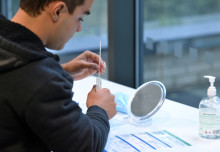Imperial’s Tech Foresight team hosted an event on technology and death in July, bringing together IBP members and the College’s experts.
The event invited attendees to imagine a world without aviation, medicines, or reliable personal identities.
The discussion set the scene about the challenges and opportunities presented by robotics and emerging AI research, before asking participants to engage in a tech foresight workshop exploring the technologies, practices, industries, and organisations that will be, need to be, or can be killed off by AI and robotics.
Dr Simon Hepworth, Director of the Imperial Enterprise team, opened the event. He commented: “While today is about fun and imagination there is a lot of power in the process. This event brings together large corporates, start-ups, founders, and investors; it’s that mix that makes the scenarios you envisage plausible and makes this event exciting and interesting.”
Setting the scene for innovation
The scene was set by Dr Antoine Cully, Senior Lecturer in the Department of Computing, who introduced his work in mapping the development of AI - capturing robots, brain interfaces, cognition, planning, reasoning, natural language, and processing - in one universe.
We need to constantly switch goals and focus on something else because it might provide a stepping stone to new technologies Dr Antoine Cully Department of Computing
He explained that while this vast AI universe is always expanding, the path to innovation is not always linear and certain branches will inevitably die off.
“We need to constantly switch goals and focus on something else because it might provide a stepping stone to new technologies,” he explained.
“For example, the microwave did not develop directly from the wood stove, first we had to discover radar,” he added.
This concept of goal-switching is integral to innovation. Combining better or novel technologies can lead to a larger diversity of solutions, essentially providing alternatives in case something goes wrong - much like a natural evolution in the face of mass extinction.
Dr Cully concluded: “We need to leverage the creativity of open-ended innovations and adaptation to face any type of situation that the real world might encounter.”
Innovative thinking in practice: workshopping with Tech Foresight
With the concept of goal switching in mind, attendees moved on to the interactive workshop hosted by Nick Price and Emilie Didier from Imperial Tech Foresight.
Imperial’s Foresight programme uses research to investigate different futures and how they could impact, positively and negatively on an organisation, in five, ten or twenty years or more.
They asked attendees to think about a product, service, or experience that their organisation delivers which we would currently consider irreplaceable (or unthinkably replaceable). A simple example would be the mobile phone.
Groups then thought about why it might need to be replaced, what technical or business reasons there are that make its replacement unthinkable, and what features an ideal replacement would have, even if that is not technically possible yet.
Discussions ranged from how society would function if we could no longer reliably identify one another, to how we might replace digital systems and reinvest in physical processes.
A similar theme of trust emerged from all the scenarios, as Emilie Didier explained: “The discussions reflected what foresight research really is. It’s not just about technologies, it’s about how we interact with that technology, looking into the future as layers.”
How technology dies is just as important as how it survives. Nick Price Foresight Strategy Manager
Having theoretically scrapped the entire aviation industry, one group explored high-speed trains, carbon budgets and virtual travel to synthetic environments. One group presented a range of alternatives to medical pills, including skin patches and therapeutic plasters and improvements in preventive health monitoring through smart tech. Another questioned if AI could one day irradicate the concept of work, and in turn money and banking.
The scenarios were enhanced by the diverse perspectives the partners brought from their respective industry sectors. Nick Price added: “How technology dies is just as important as how it survives. These groups have produced some dramatic scenarios today that we may look back on in another 20 years time and see come to fruition.
Article text (excluding photos or graphics) © Imperial College London.
Photos and graphics subject to third party copyright used with permission or © Imperial College London.
Reporters
Gavin Reed
Enterprise

Contact details
Tel: +44 (0)20 7594 6551
Email: g.reed@imperial.ac.uk
Show all stories by this author
Nick Price
Enterprise



